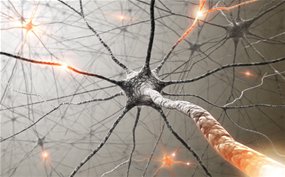About artificial neurons and neurointerface
Recently reading News in Science came across interesting information about the development of a Japanese scientist. He plans to soon create nanoscale devices capable of controlling neurons in the human brain. This article is partly a free translation of the article “Nanotechnology may tap into your mind”, but to a large extent complements and reveals the possible applications of this technology, and here I tried to accumulate various achievements related to this type of development.

Speaking at the recent Sydney conference, Keiichi Torimitsu said that “Establishing a link between the brain and electronics is important for further understanding how the brain works as well as for gaining control over the activity of neurons. Our final goal is to create devices capable of reading information from the brain and transmitting it to a computer. ” Although it is rather difficult to believe in the possibility of this at the moment, the emergence of such devices may become a new word in the development of treatment of various neurological diseases, such as, for example, paralysis. Also, over time, such studies can lead to the creation of organs responsible for different feelings (the appearance of artificial eyes and ears).
The device they are planning to create will include a nano-sized electrode coated with a membrane resembling a living cell membrane, including those containing receptor proteins that most actively influence neuron activity. Artificial neurons will allow to investigate the signals transmitted in the brain to the computer and return the modified ones.
')

At present, Harvard scientists, under the direction of Charles Lieber, are conducting research on the delivery of electrical impulses to individual brain neurons. "We created the first artificial synapse, our device can stimulate or suppress the propagation of signals along the axons in the human brain." Professor Lieber’s group is currently working on neurotransmitter research - chemicals that transmit information between neurons. To this end, scientists have connected artificial synapses to a neural network consisting of several living neurons.

Also noteworthy is the development of German scientists from Tübingen - a headdress with which a paralyzed person can use a computer: type text, surf the Internet. The device is imperfect - it takes a long time to learn by trial and error to correctly recognize the owner’s mental commands, but the end result of the prototypes is already encouraging for the future of such a manipulator. I remember one of the House series, where such a device has already been applied :)
What to read on the topic:
1. News in Science
2. Popular mechanics

Speaking at the recent Sydney conference, Keiichi Torimitsu said that “Establishing a link between the brain and electronics is important for further understanding how the brain works as well as for gaining control over the activity of neurons. Our final goal is to create devices capable of reading information from the brain and transmitting it to a computer. ” Although it is rather difficult to believe in the possibility of this at the moment, the emergence of such devices may become a new word in the development of treatment of various neurological diseases, such as, for example, paralysis. Also, over time, such studies can lead to the creation of organs responsible for different feelings (the appearance of artificial eyes and ears).
The device they are planning to create will include a nano-sized electrode coated with a membrane resembling a living cell membrane, including those containing receptor proteins that most actively influence neuron activity. Artificial neurons will allow to investigate the signals transmitted in the brain to the computer and return the modified ones.
')

At present, Harvard scientists, under the direction of Charles Lieber, are conducting research on the delivery of electrical impulses to individual brain neurons. "We created the first artificial synapse, our device can stimulate or suppress the propagation of signals along the axons in the human brain." Professor Lieber’s group is currently working on neurotransmitter research - chemicals that transmit information between neurons. To this end, scientists have connected artificial synapses to a neural network consisting of several living neurons.

Also noteworthy is the development of German scientists from Tübingen - a headdress with which a paralyzed person can use a computer: type text, surf the Internet. The device is imperfect - it takes a long time to learn by trial and error to correctly recognize the owner’s mental commands, but the end result of the prototypes is already encouraging for the future of such a manipulator. I remember one of the House series, where such a device has already been applied :)
What to read on the topic:
1. News in Science
2. Popular mechanics
Source: https://habr.com/ru/post/86688/
All Articles